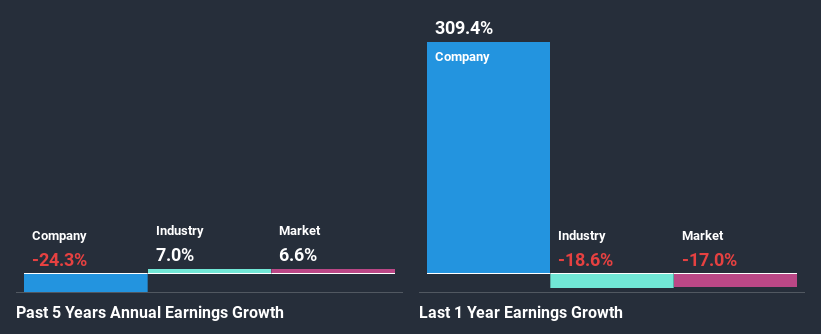- Netherlands
- /
- Professional Services
- /
- ENXTAM:BRNL
Brunel International N.V.'s (AMS:BRNL) Stock's Been Going Strong: Could Weak Financials Mean The Market Will Correct Its Share Price?

Brunel International (AMS:BRNL) has had a great run on the share market with its stock up by a significant 23% over the last three months. We, however wanted to have a closer look at its key financial indicators as the markets usually pay for long-term fundamentals, and in this case, they don't look very promising. In this article, we decided to focus on Brunel International's ROE.
Return on Equity or ROE is a test of how effectively a company is growing its value and managing investors’ money. Simply put, it is used to assess the profitability of a company in relation to its equity capital.
See our latest analysis for Brunel International
How To Calculate Return On Equity?
ROE can be calculated by using the formula:
Return on Equity = Net Profit (from continuing operations) ÷ Shareholders' Equity
So, based on the above formula, the ROE for Brunel International is:
6.4% = €18m ÷ €275m (Based on the trailing twelve months to December 2020).
The 'return' is the income the business earned over the last year. That means that for every €1 worth of shareholders' equity, the company generated €0.06 in profit.
What Has ROE Got To Do With Earnings Growth?
We have already established that ROE serves as an efficient profit-generating gauge for a company's future earnings. Based on how much of its profits the company chooses to reinvest or "retain", we are then able to evaluate a company's future ability to generate profits. Assuming everything else remains unchanged, the higher the ROE and profit retention, the higher the growth rate of a company compared to companies that don't necessarily bear these characteristics.
Brunel International's Earnings Growth And 6.4% ROE
At first glance, Brunel International's ROE doesn't look very promising. Next, when compared to the average industry ROE of 11%, the company's ROE leaves us feeling even less enthusiastic. For this reason, Brunel International's five year net income decline of 24% is not surprising given its lower ROE. However, there could also be other factors causing the earnings to decline. For example, it is possible that the business has allocated capital poorly or that the company has a very high payout ratio.
However, when we compared Brunel International's growth with the industry we found that while the company's earnings have been shrinking, the industry has seen an earnings growth of 2.4% in the same period. This is quite worrisome.

The basis for attaching value to a company is, to a great extent, tied to its earnings growth. What investors need to determine next is if the expected earnings growth, or the lack of it, is already built into the share price. By doing so, they will have an idea if the stock is headed into clear blue waters or if swampy waters await. Has the market priced in the future outlook for BRNL? You can find out in our latest intrinsic value infographic research report.
Is Brunel International Using Its Retained Earnings Effectively?
Brunel International has a high three-year median payout ratio of 64% (that is, it is retaining 36% of its profits). This suggests that the company is paying most of its profits as dividends to its shareholders. This goes some way in explaining why its earnings have been shrinking. With only very little left to reinvest into the business, growth in earnings is far from likely.
In addition, Brunel International has been paying dividends over a period of at least ten years suggesting that keeping up dividend payments is way more important to the management even if it comes at the cost of business growth. Upon studying the latest analysts' consensus data, we found that the company is expected to keep paying out approximately 64% of its profits over the next three years. Regardless, the future ROE for Brunel International is predicted to rise to 10% despite there being not much change expected in its payout ratio.
Conclusion
In total, we would have a hard think before deciding on any investment action concerning Brunel International. Because the company is not reinvesting much into the business, and given the low ROE, it's not surprising to see the lack or absence of growth in its earnings. That being so, the latest industry analyst forecasts show that the analysts are expecting to see a huge improvement in the company's earnings growth rate. To know more about the latest analysts predictions for the company, check out this visualization of analyst forecasts for the company.
If you decide to trade Brunel International, use the lowest-cost* platform that is rated #1 Overall by Barron’s, Interactive Brokers. Trade stocks, options, futures, forex, bonds and funds on 135 markets, all from a single integrated account. Promoted
Valuation is complex, but we're here to simplify it.
Discover if Brunel International might be undervalued or overvalued with our detailed analysis, featuring fair value estimates, potential risks, dividends, insider trades, and its financial condition.
Access Free AnalysisThis article by Simply Wall St is general in nature. It does not constitute a recommendation to buy or sell any stock, and does not take account of your objectives, or your financial situation. We aim to bring you long-term focused analysis driven by fundamental data. Note that our analysis may not factor in the latest price-sensitive company announcements or qualitative material. Simply Wall St has no position in any stocks mentioned.
*Interactive Brokers Rated Lowest Cost Broker by StockBrokers.com Annual Online Review 2020
Have feedback on this article? Concerned about the content? Get in touch with us directly. Alternatively, email editorial-team (at) simplywallst.com.
About ENXTAM:BRNL
Brunel International
Provides secondment, project management, recruitment, and consultancy services in the Netherlands, Germany, Austria, Switzerland, Czech Republic, Australasia, the Middle East, India, rest of Asia, the Americas, and internationally.
Undervalued with excellent balance sheet.
Similar Companies
Market Insights
Community Narratives




